

It’s often hard to separate the noise from the signal in politics.
The noise is that congressional Democrats are fighting President Donald Trump and Republicans over a prospective government shutdown and healthcare spending.
The signal is scratchy. But if you turn the squelch knob, you may detect the signal.
We won’t know who "wins" or is "blamed" for a government shutdown for weeks. But the government shutdown will likely tell us a great deal about the future of the Democratic Party.
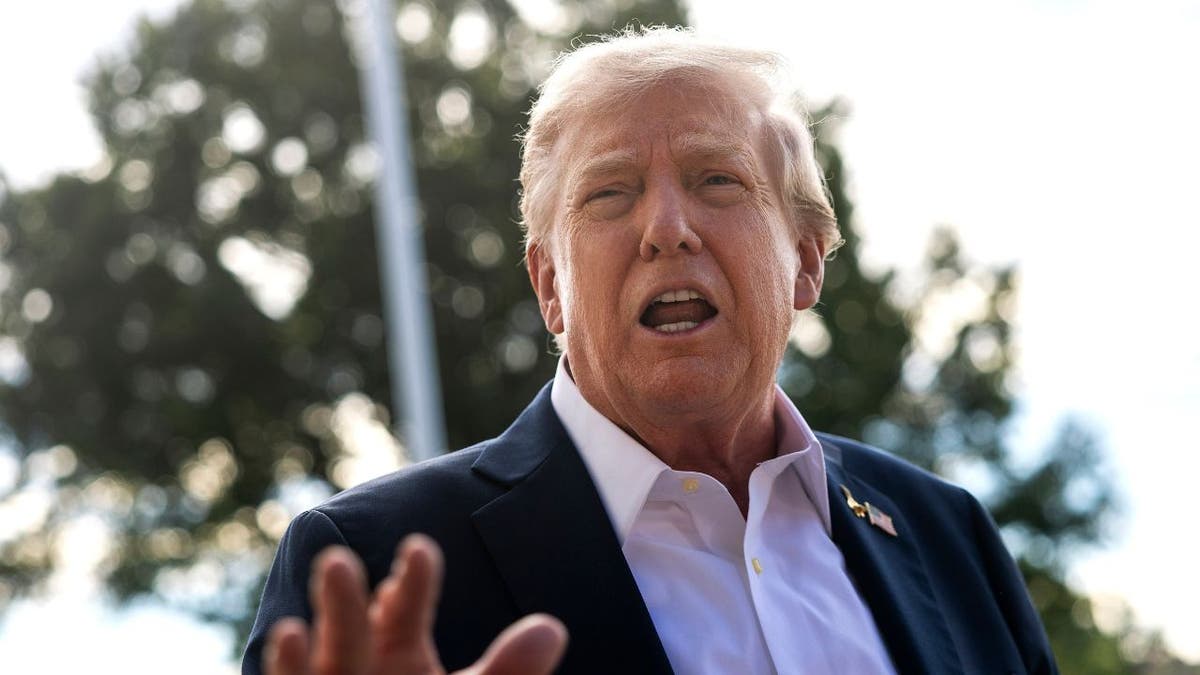
President Donald Trump speaks to members of the media as he departs the White House on Sept. 26, 2025, in Washington, D.C. (Kevin Dietsch/Getty Images)
Progressives excoriated Senate Minority Leader Chuck Schumer, D-N.Y., in March when he reluctantly provided Democratic votes to break a filibuster to avoid a government shutdown.
Democrats on both sides of Capitol Hill were apoplectic. They felt betrayed by Schumer. The New York Democrat caved to Republicans to avert the shutdown without pocketing any political concessions in return. At the time, Schumer said a shutdown under those conditions would be worse. Elon Musk was busy filleting the federal government. To hear Schumer tell it, Musk may try to block parts of the federal government from ever opening again.
Progressives fumed at Schumer. Some called for new leadership.
"There was a disappointment because Schumer had said that he was going to vote against it, and then he voted for it," said Rep. Suhas Subramanyam, D-Va., to Fox. "So there was some confusion about why he would do that."
REPORTER'S NOTEBOOK: GOVERNMENT SHUTDOWN CHANCES ASTRONOMICAL AS CONGRESS BARRELS TOWARD DEADLINE
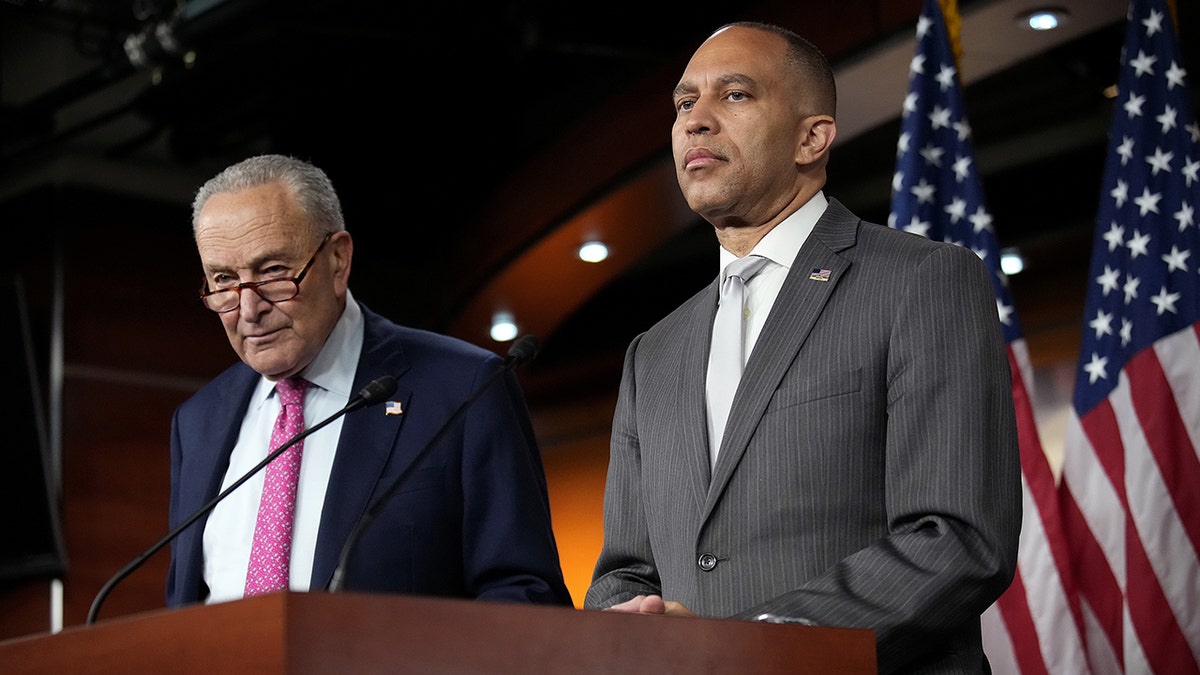
Senate Minority Leader Charles Schumer and House Minority Leader Hakeem Jeffries speak at a press conference at the U.S. Capitol on June 11, 2025, in Washington, D.C. (Kevin Dietsch/Getty Images)
House Minority Leader Hakeem Jeffries, D-N.Y., and other top Democrats seethed about Schumer’s March move. A senior House Republican source told Fox recently that they were stunned the government didn’t close earlier this year — surprised at Schumer’s decision to cave.
And so liberals thought that Schumer may have overstayed his welcome, and it was time to move on.
Schumer didn’t provide the necessary votes to avoid a shutdown when the Senate took a test vote to clear the way for the House-approved interim spending bill a week-and-a-half ago. So that made Schumer an easy target of the right. Plus, calling it the "Schumer Shutdown" is alliterative. It rolls off the tongue and easy for the GOP to characterize what’s going on.
That’s why lots of Republicans — and some Democrats — hope Schumer faces a challenge from Rep. Alexandria Ocasio-Cortez, D-N.Y.
This explains how Republicans are trying to always flag a potential challenge to Schumer by Ocasio-Cortez. They portray Schumer as finding himself in a tight spot, having to appeal to the left-leaning base of the Democratic Party. If Democrats fold, they face an avalanche of criticism from progressives.
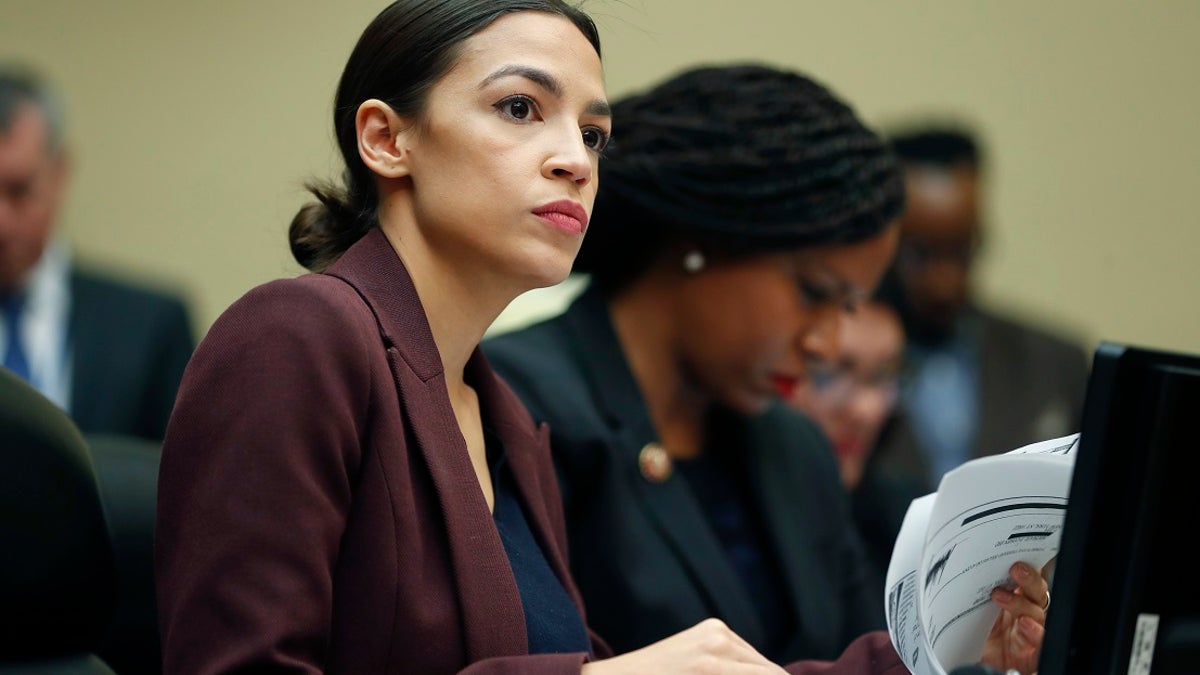
Rep. Alexandria Ocasio-Cortez, D-N.Y., left, looks over her notes during testimony by Michael Cohen, President Donald Trump's former lawyer, before the House Oversight and Reform Committee. (Pablo Martinez Monsivais/AP Photo)
"That's why Jeffries and Schumer are betwixt in between," said Rep. Mike Lawler, R-N.Y., on Fox. "Jeffries has to worry about a primary next year and Schumer's got to worry about AOC in 2028."
The star of Ocasio-Cortez could shine as Schumer’s may dim. She’s deploying rhetoric which appeals to liberals when speaking of Trump at a recent town hall meeting.
"Authoritarians rely on the perception of power," said Ocasio-Cortez. "They need people to believe that they are more powerful than they actually are."
How Schumer handles a possible shutdown could dictate the political future of Ocasio-Cortez. That’s to say nothing of his own. Political observers consistently mention Ocasio-Cortez among the top four potential Democratic presidential candidates were she to run in 2028. No one in the Democratic Party can churn out a crowd like Ocasio-Cortez. The same with raising money.
This is why Republicans believe Schumer’s resistance hinges on self-preservation.
GARBAGE COLLECTION, TOURS TO BE SUSPENDED ON CAPITOL HILL IF THERE'S A GOVERNMENT SHUTDOWN
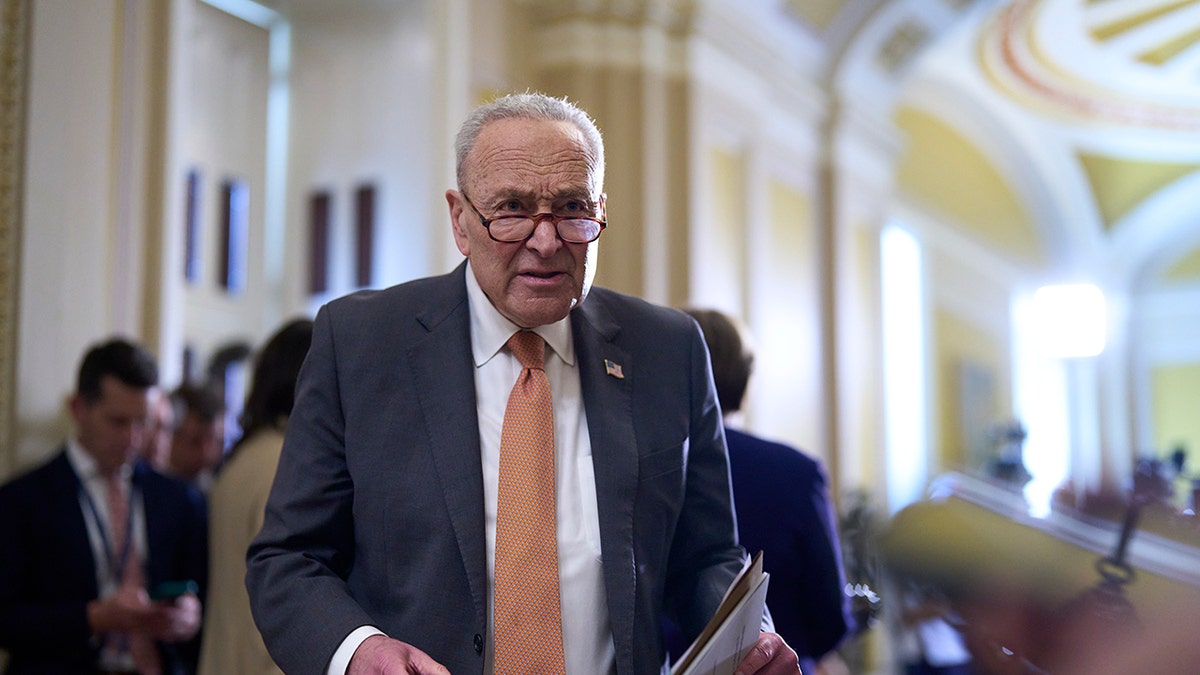
Senate Minority Leader Chuck Schumer, D-N.Y., turns to an aide during a news conference at the Capitol in Washington on June 3, 2025. (J. Scott Applewhite/AP)
"You've seen Sen. Schumer's poll numbers. He's got AOC nipping at his heels," said Treasury Secretary Scott Bessent on Fox.
Not everyone is buying the GOP line that Schumer is trying to finesse government funding around his own political fortunes.
"Do you think that Leader Schumer feels kind of footsteps from the left with Ocasio-Cortez?" asked yours truly of Jeffries.
"Leader Schumer is not even up for reelection in 2026," replied Jeffries.
Either way, Democrats have struggled since the election about how to connect with their voters and combat Trump.
"They just want to be perceived as fighting Trump," said Sen. Eric Schmitt, R-Mo., on Fox. "Chuck Schumer is afraid of his own shadow at this point. They want to be perceived as the resistance more than a party that's willing to govern."
And since many Democrats aren’t pleased with how their party has fought back at Trump…
There are few inflection points over the course of a two-year Congress. A skirmish over government funding is one of them. So Democrats must seize the opportunity.
But there is something crafty in the Democrats’ strategy, which isn’t necessarily apparent to the casual observer.
Fights over "government funding" and "avoiding a government shutdown" aren’t terribly compelling to most voters. Yes, Democrats will talk about the possibility of a shutdown impacting federal workers and thrusting the economy into uncertainty. And Democrats always seem to pepper their arguments about Trump with concerns about "instability" and "chaos," be it government funding or say, tariffs.
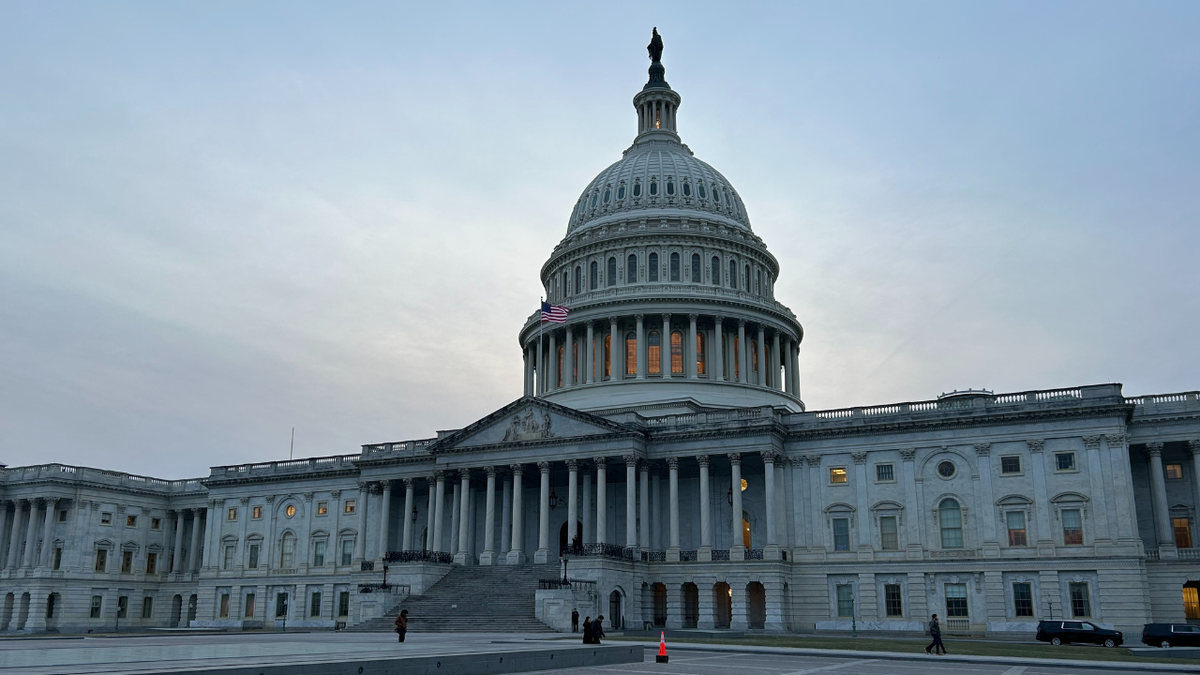
U.S. Capitol Building at sunset on Jan. 30, 2025. (Emma Woodhead/Fox News Digital)
However, it’s no surprise that Democrats are attempting to convert the shutdown into something more tangible for millions of Americans: The high cost of healthcare coverage.
"Republicans have refused to extend the Affordable Care Act tax credits, and as a result of that, millions of working-class Americans are going to experience skyrocketing premiums, co-pays and deductibles at a time when America is already too expensive," said Jeffries.
First, Democrats are pushing for a restoration of what they say are cuts to federal health care benefits under the One, Big, Beautiful Bill. On its face, government funding has nothing to do with what congressional Republicans approved under the hallmark of Trump’s legislative agenda. But, as we said, this is one of those inflection points. So it’s an opportunity for Democrats to emphasize what Republicans passed and portray it as a negative ahead of the 2026 midterms.
Secondly, Democrats are pushing for a renewal of subsidies for Obamacare to make healthcare costs more affordable. If Congress fails to act, costs spike for tens of millions of Americans. Granted, those subsidies don’t expire until the end of the calendar year. Not the government’s fiscal year on Oct. 1. But households will start receiving notices in the mail soon about prospective price hikes. Time the arrival of those notices with a protracted government shutdown and the Democratic arguments might start to resonate with voters.
And while votes from Democrats are essential to break a filibuster on any possible agreement, Democrats are sure to remind voters which party is in charge in Washington right now.

Speaker Mike Johnson, left, and Minority Leader Hakeem Jeffries are pictured in July 2024. (Getty Images)
"Republicans control the House and the Senate. And there's a Republican president. If the government shuts down, it's because Republicans want to shut the government down," said Jeffries.
A lot of noise will consume Washington’s bandwidth if there’s a government shutdown. The sides will cast aspersions. They’ll blame each other. They want to see whose arguments resonate with people.
But if you slice through the noise, you can detect the signal. It may appear on a weak, scratchy wavelength. But a lot of the fight over a shutdown centers on how Democrats try to posture themselves against Trump, shore up their base and settle on an approach for 2026.
